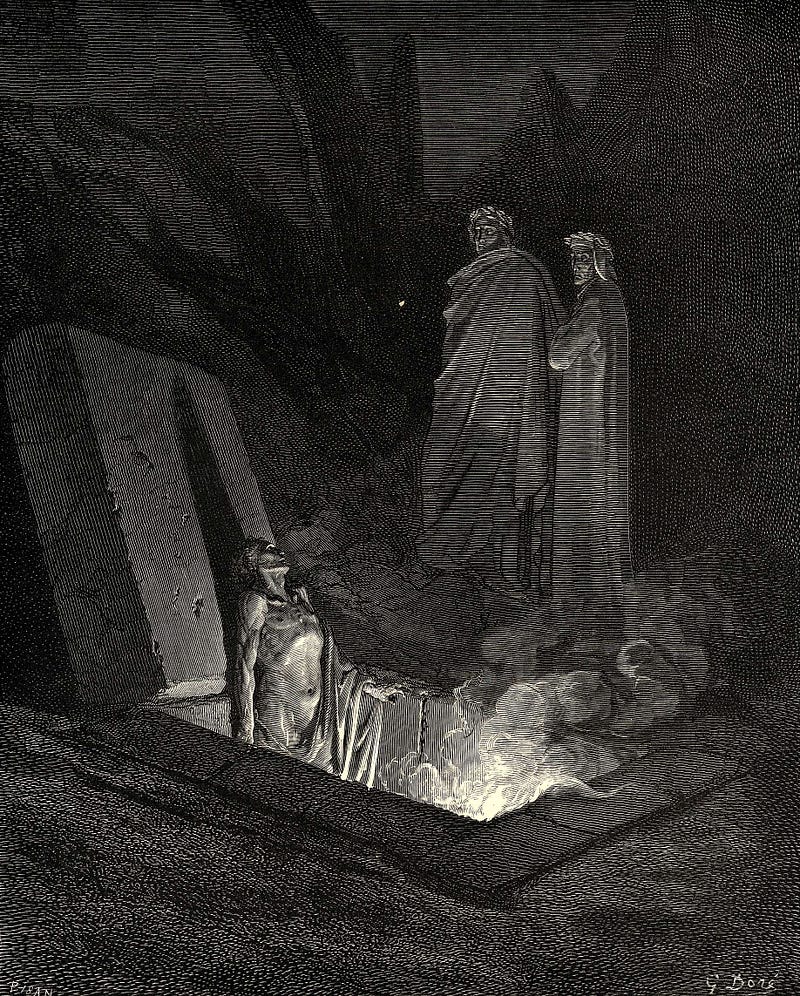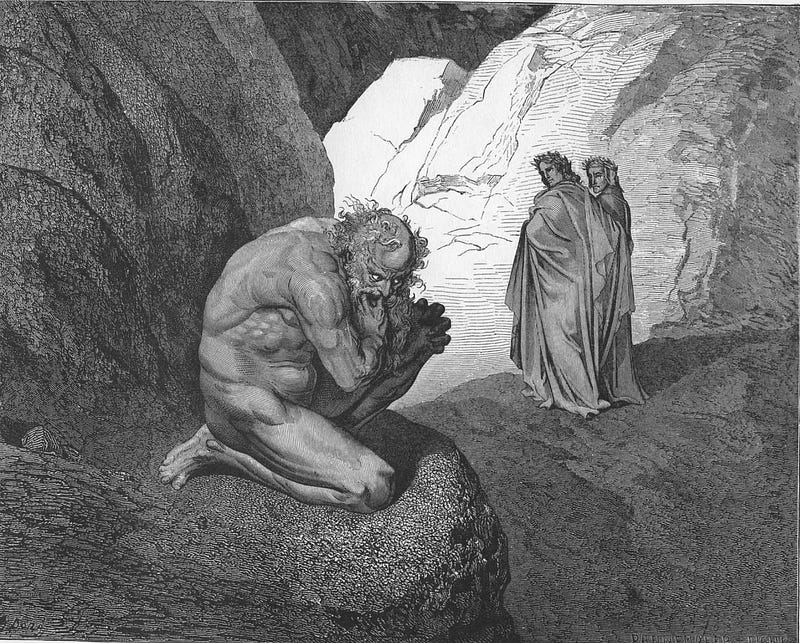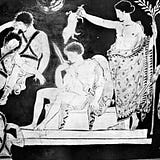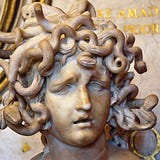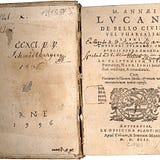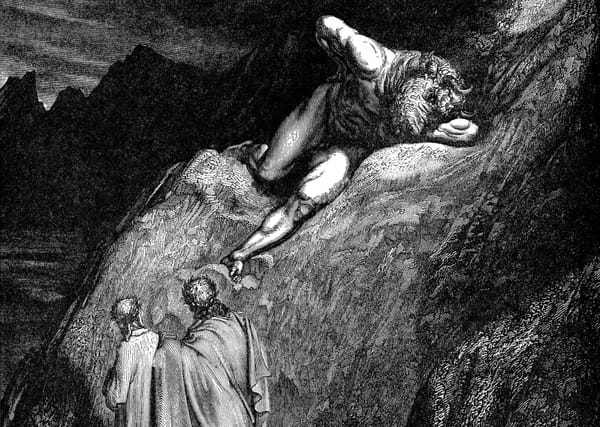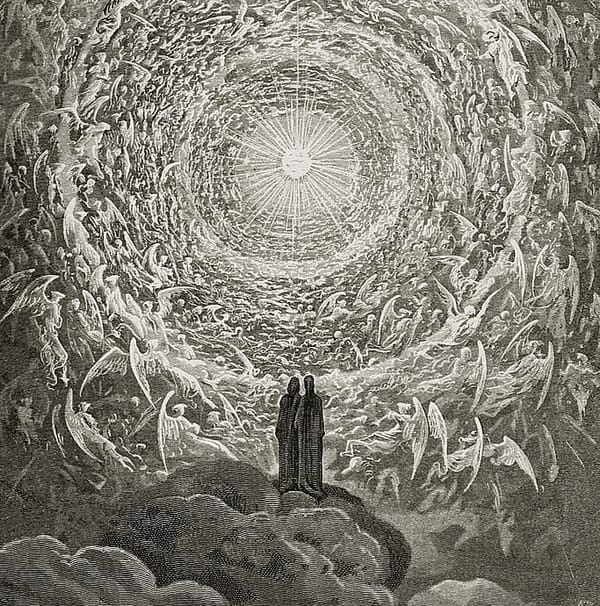Dante’s Inferno: Canto IX
Divine Comedy Series — Summary of Inferno, Canto 9. It’s raining angels hallelujah, having a bouncer in Hell is more useful than a VIP…
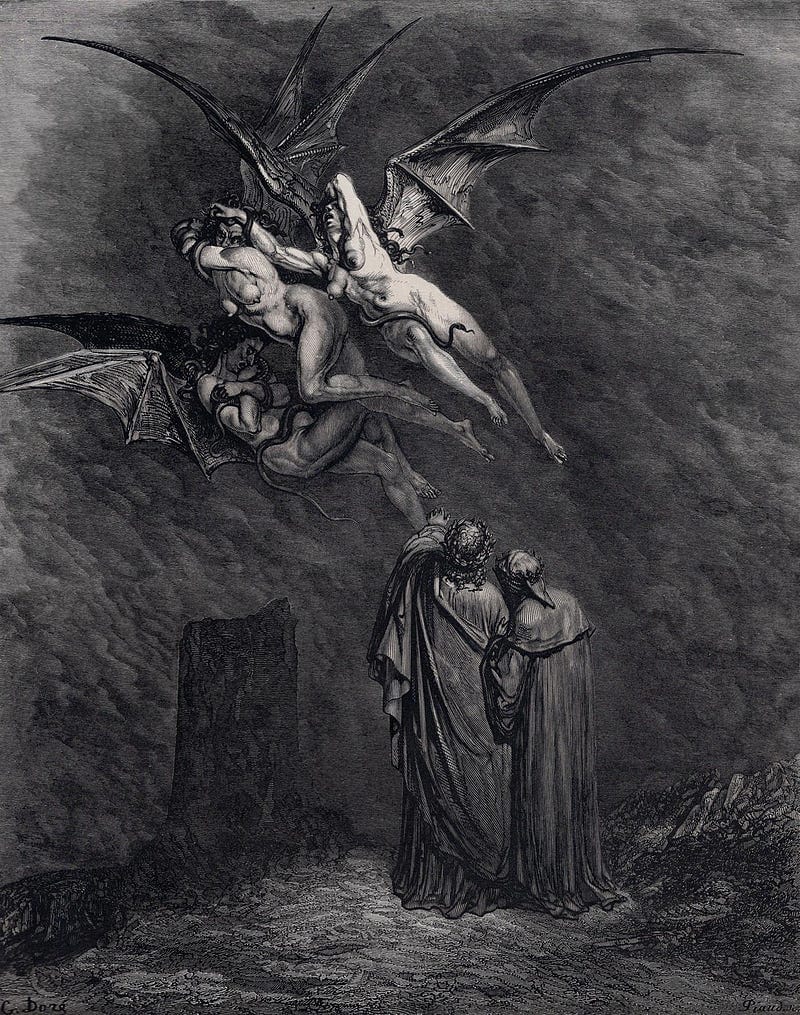
DIVINE COMEDY SERIES
Dante’s Inferno: Canto IX
It’s raining angels hallelujah, having a bouncer in Hell is worth more than a VIP pass!
Introductory note: Students of European literature at the University Grenoble Alpes have been contacting me regarding this series, saying how useful is to them both in exams and personal life. I wish you all the best in your studies; rest assured that if you pursue your interests, only good things will come along!
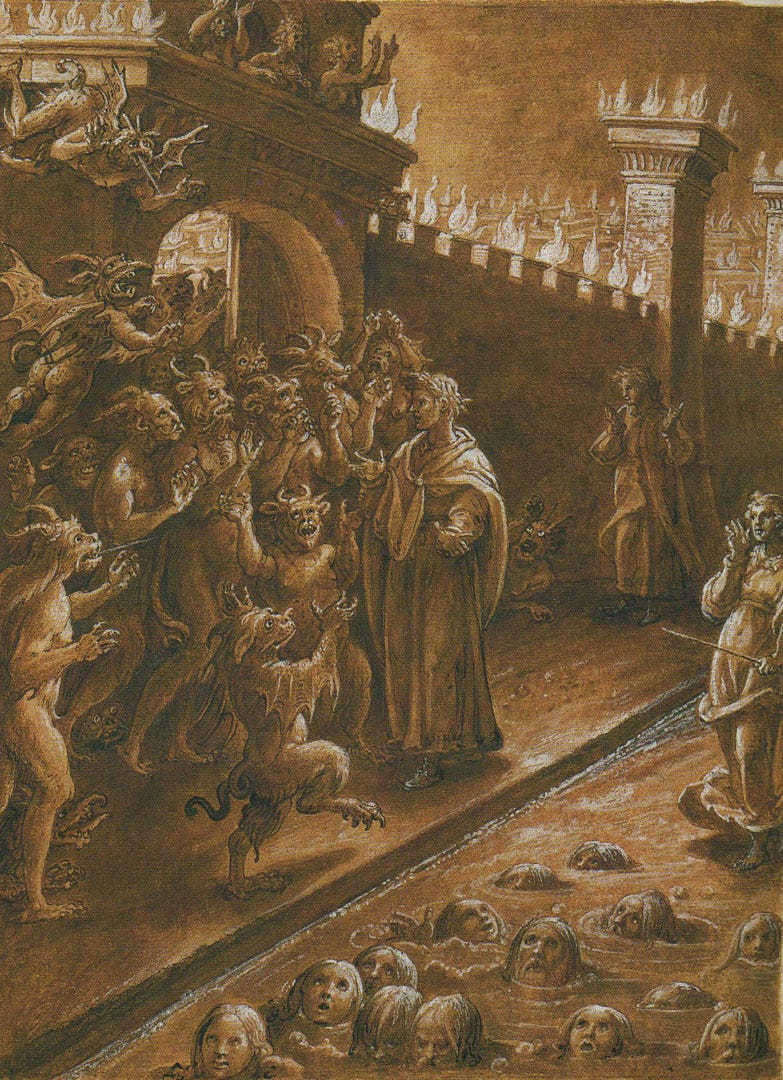
Doubts and Fears of Dante
So here we are and following from canto 8th, Virgil feels defeated as he did not manage to convince the devils to let them pass, the two poets now are stuck and cannot progress their journey.
“We have to win this battle,” he began,
“if not. . . But one so great had offered help.
How slow that someone’s coming to see me!”
Line 7–9 (tr. Mandelbaum, Inferno: Canto 9)
The fear shown by Dante at the end of the previous Canto leads Virgil to hide his worry, while he listens intently for the arrival of the celestial messenger. The Latin poet utters some words of doubt, which he immediately corrects so as not to increase the disciple’s fear.
(On this point I expressed my concerns in the previous chapter VIII, showing how catholicism yes praises intellect, but still says that without divine grace your chances of success are pretty slim.)
At this point, Dante asks Virgil something I honestly expected a lot earlier in this poem.
He asks whether any soul from Limbo has ever descended in deep Hell, Virgil replies that, although this rarely happens, it has already happened to him shortly after his death when the sorceress Erichtho had summoned him to draw out from Giudecca the soul of a traitor.
Not just a hard spelling, but an interesting prequel too
Wow wow wow, wait a minute Virgil, we knew you belonged to Limbo, but now entities send you on errands too? This man has got connections!
I, in truth, have been here once before:
that savage witch Erichtho, she who called
the shades back to their bodies, summoned me.
My flesh had not been long stripped off when she
had me descend through all the rings of Hell,
to draw a spirit back from Judas’ circle.
Line 22–27 (tr. Mandelbaum, Inferno: Canto 9)
So, who is Erichtho?
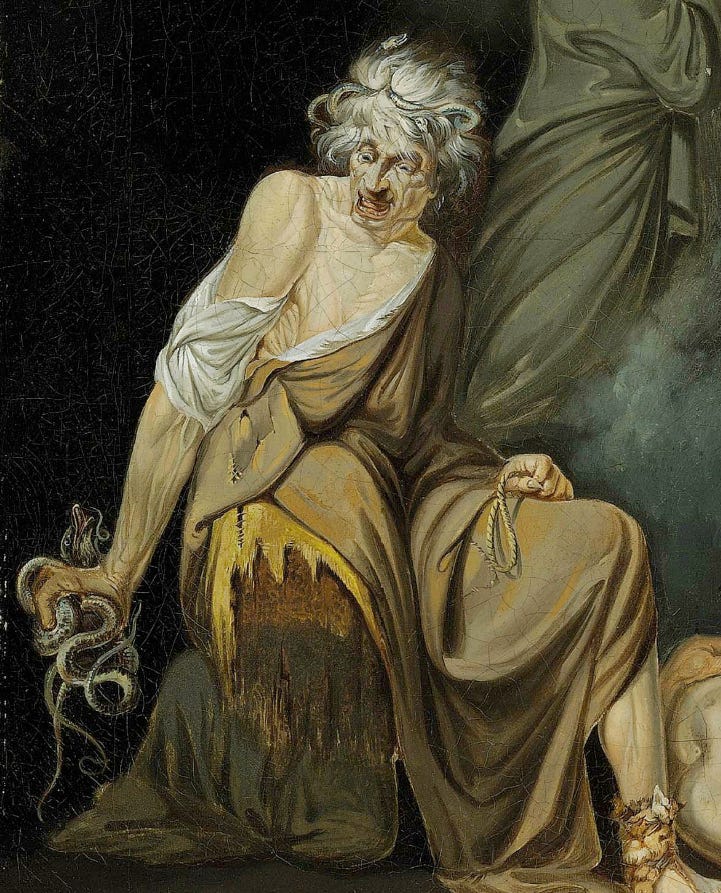
(from Ancient Greek: Ἐριχθώ) is a legendary Thessalian witch who appears quite often in literary works. In this case, Dante surely takes inspiration from Bellum Civile of Lucano, VI, 508 ss. In this, is said that Erichthon revived the soul of a dead man to reveal Pompeus the result of the Farsalo Battle.
She also comes back in interesting works of literature such as the Faust of Goethe.
I’ve decided to include a second picture of the witch as the first one looked a bit creepy, so if you are like me, a bit more classical this painting from Domenichino (1581–1941) might put you more at ease.
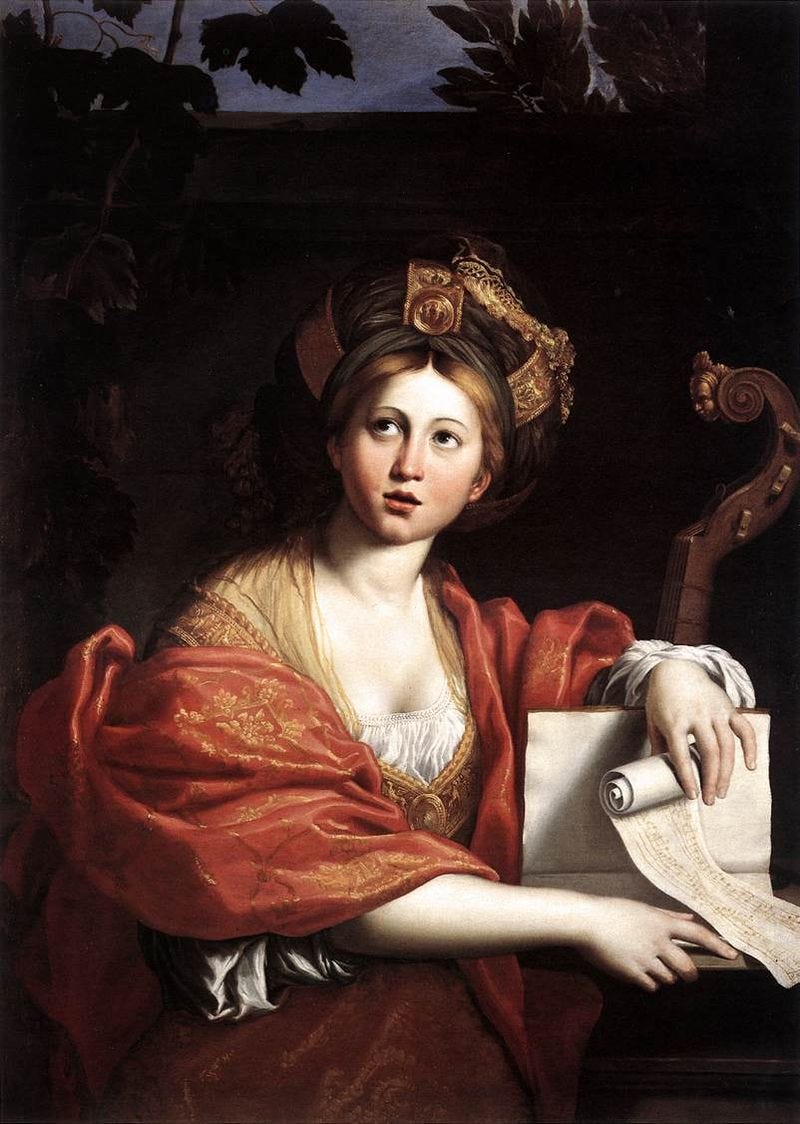
However, it must be said that Virgil, even though is sent on errands by entities, has limited knowledge of the infernal map; this is because his first descent occurred before the coming of Christ.
He ignores, for example, that some rocky bridges in the Malebolge collapsed due to the earthquake following the death of Jesus and this will cause the deception that will be perpetrated against him by the Malebranche; instead he will be completely inexperienced in Purgatory, where he will even be forced to ask the penitents several times what is the quickest way to ascent.
(I do wonder if many of you readers now have noticed I’ve mixed up Erichtho, with the Cumean Sybil in the second painting. Feel fooled? Testing your attention here, like Virgil does with Dante!)
The enemies are here
Virgil adds other words to the conversation, however, Dante does not listen to, since his gaze is drawn to the top of the walls by the appearance of the three infernal Furies, stained with blood and with serpentine hair.
And he said more, but I cannot remember
because my eyes had wholly taken me
to that high tower with the glowing summit
where, at one single point, there suddenly
stood three infernal Furies flecked with blood,
who had the limbs of women and their ways
Line 34–39 (tr. Mandelbaum, Inferno: Canto 9)
Virgil recognizes them immediately (of course he does) and explains to Dante that the one on the left is Megaera (“Jealous”), the one on the right is Alecto (“Unceasing in anger”) and Tisiphone (“Avenger of Murder”) is in the centre.
They tear their chests with their nails (ewww), hit each other with open palms and scream so loudly that they induce Dante to cling to Virgil. They all invoke the arrival of Medusa (does she need any introduction?) to petrify Dante, so Virgil urges him to turn and close his eyes with his hands so as not to see the Gorgon. Dante obeys and Virgil, to be sure, puts his hands on Dante’s so as not to prevent him from looking.
Worry not, angels got your back!
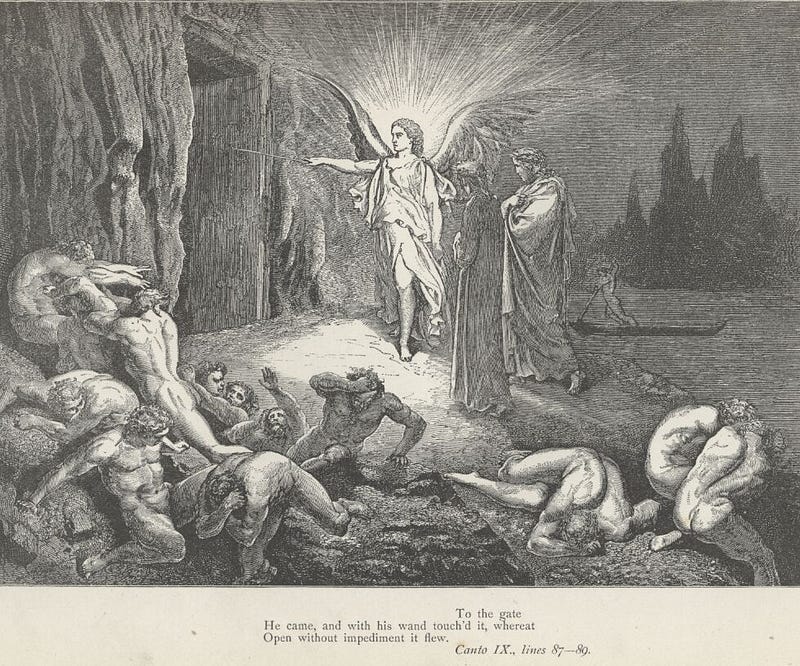
Suddenly from the sky ( if there is one down there) an angel arrives and Virgil allows Dante to open his eyes and tells him to look towards the smoke of the swamp, where the celestial messenger can be seen advancing without touching the water.
The celestial creature advances, waving the vapour of the marsh away from his face with his hand, while in front of him the souls of the angry disappear.
Virgil motions for Dante to bow before him, who seems full of disdain towards that place.
The messenger arrives at the gate of the city of Dis and, after opening it with a staff, begins to harshly rebuke the devils.
He blames their arrogance, the fact that they vainly oppose the passage of the two poets and recalls that Cerberus had already refused to let Hercules enter Hell, a fact which is why he still has a skinned chin and goitre.
At this point, the messenger returns from where he came, without saying a word to the two poets who approach the walls of Dis without obstacles.
Entering the city of Dis
Dante and Virgil enter the city without any opposition and Dante, eager to see the condition of the damned, turns his gaze around seeing tombs similar to those in the cemeteries of Arles and Pula everywhere.
The tombs are on fire and have their lids raised, while miserable moans come from the tombs.
Dante asks Virgil for explanations and the master explains that inside there are the souls of the heresiarchs and their followers of each sect, condemned to burn to a greater or lesser extent depending on the severity of the heresy they followed in life. Virgil heads to the right and Dante follows him among the tombs and battlements of the city.
Reflection from canto 8th and 9th
Now, let’s unpack a little about what happened here.
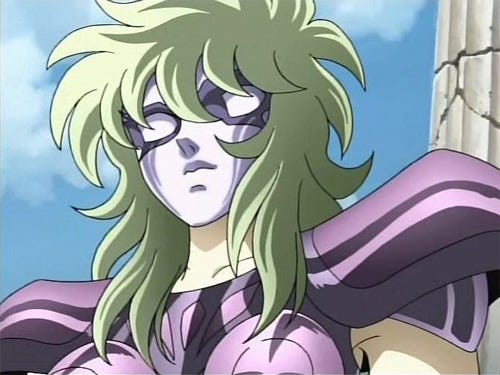
(Can’t recognize who this is? It’s one of the three Furies, Tisiphone from Masami Kurumada’s Saint Seiya, Manga Series 1985–1990. See? we still take inspiration from the classical world, even today!)
In this chapter the story is intriguing, and while of course the city of Dis sends off Gotham City vibes, with the angel acting as our Batman; the are some considerations to be made.
- The first and most disturbing point is the one of divine grace, and we have already talked about this in canto 8.
Essentially is the need for the help and assistance of divine Grace to overcome the obstacles of sin, without which reason alone is insufficient in itself.
To me this not only sounds naive, but also coward, as it reduces our reason and bravery towards life to a mere waiting of divine grace. Christopher Hitchens back in his days has done extensive lectures on this topic, and if you are in doubt, I strongly recommend you to read “God is Not Great, published in 2007”.
God’s help is necessary for Dante to overcome his doubts and his cowardice, as had already happened in the forest through Virgil, and to overcome the opposition of the demons which is in any case in vain as his journey is not crazy but wanted by Heaven, as the messenger does not fail to remind the devils in his reproaches.
2. It is almost impossible, then, to identify with certainty the messenger, whom many commentators have indicated in an angel (one of the archangels, Gabriel or Michael?), others in a pagan character (Mercury?), still others in a contemporary of Dante.
Is that important? Hell (lol) Yes!
Because if it had a name we would know this is an armour plot. The city of Dis represents the border between the Upper and Lower Hell where the most serious sins (those of violence and fraud) are punished, so Dante’s passage probably has a particular delicacy that makes a superior intervention necessary, that would have made an interesting insertion in this greek world of figures.
Not giving this figure a name strengthens the point mentioned above, by sharing the concept of divine grace as something that we all need in order to conduct a good life with intellect.
3. The Furies and Medusa are the usual demonization of classical deities of the underworld
Now, let’s clear one thing, once and for all.
The church had no idea what Hell looked like before Dante wrote the Divine Comedy, and even artists struggled with how to represent it. This whole mix of mythology gave the church not only a way to strengthen what’s in the afterlife, but also a way to visualize it.
But did it really need to have classical demons? That just shows how this is all made by us. Hell, Paradise, everything is here and now and we are living it.
If I ever get to go this type of afterlife, please put me in Limbo; as I would rather spend eternity with great thinkers than contemplate the infinity of a being that has created such a compartmentalized afterlife.
Conclusion
I hope you enjoyed this Canto 9 analysis, I’ve been reading during my stay in Germany for a family visit in Easter; in the lovely city of Northeim, Lower Saxony.

As usual, if you have any questions, please don’t hesitate to contact me via email or the comment section below.
Find some useful links below and don’t forget to clap, comment and subscribe!
P.S.
I know you have been waiting a while for Canto 10, but finally is now released, click here to read!
Useful Links
